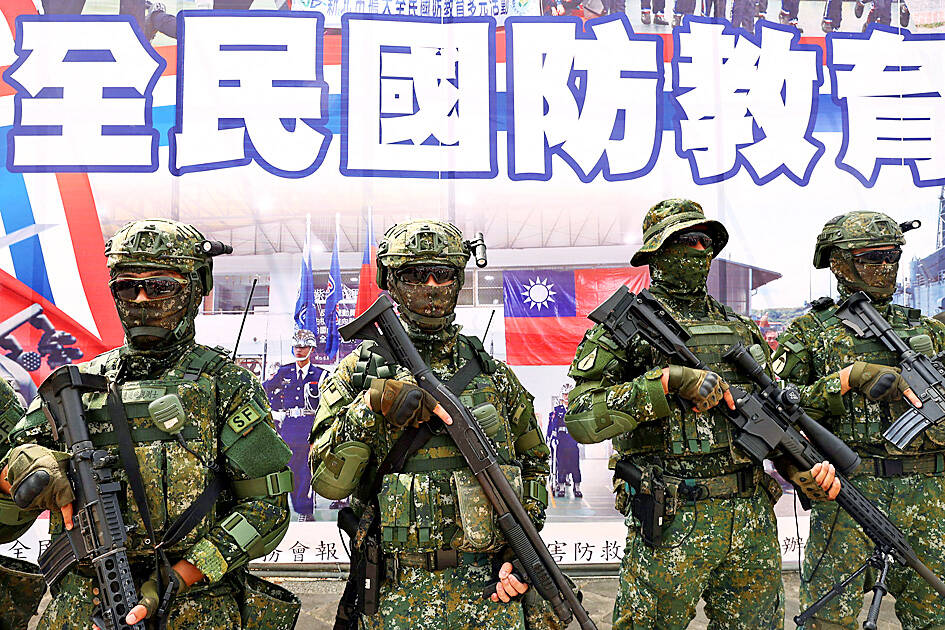Taiwan should continue to enhance military preparedness and encourage the public to fight, as the Chinese Communist Party’s (CCP) taste for risk-taking under Chinese President Xi Jinping’s (習近平) consolidated leadership remains to be seen, Taiwanese analysts said.
The CCP’s 20th National Congress concluded over the weekend with Xi retaining power for an unprecedented third term and stacking his government with loyalists.
US analysis and government figures have raised the possibility of Beijing developing the capability to attack Taiwan by 2027, with Washington pledging to provide Taiwan with the ability to resist invasion.

Photo: Ann Wang, REUTERS
China has no chance of successfully invading Taiwan, National Security Bureau Director-General Chen Ming-tong (陳明通) told legislators last week.
If China makes a show of military force as early as next year, as some pundits speculate, it would be with the goal of forcing Taiwan to the negotiating table, Chen said.
Whether the installment of Xi loyalists to the politburo would accelerate military aggression toward Taiwan remains to be seen, Institute for National Defense and Security Research analyst Su Tzu-yun (蘇紫雲) said on Sunday.
Xi might prioritize consolidating his power in his third term, although there is the possibility he could redirect internal strife toward external conflict if his grip on power wanes, Su said.
The politburo also includes military figures with a background in Taiwan issues, including Central Military Commission Vice Chairman He Weidong (何衛東) and Eastern Theater Commander Lin Xiangyang (林向陽), Su said.
The CCP “is serious about its military preparations at this stage,” he said. “We cannot afford to take them lightly.”
An absence of dissenting voices in the Central Politburo Standing Committee of the CCP could increase the chance that inaccurate information could lead the group to engage in riskier behavior, institute analyst Shu Hsiao-huang (舒孝煌) said.
The Chinese People’s Liberation Army (PLA) still needs two to three years to develop the amphibious warfare capability required to acquire Taiwan, Shu added.
Although the accuracy of PLA missiles has improved in recent years, “Taiwan is not Pearl Harbor,” Su said, meaning that the possibility of defeating Taiwan in a surprise attack is low.
Military operations in other countries have shown that the tactical success of missile strikes is gradually becoming marginal in modern warfare, despite any psychological pressure they place on those being attacked, he said.
If the PLA is unable to win in a full-scale offense and must resort to a blockade or annexing outlying islands, international sanctions could take effect, he said.
The key to facing uncertainties is to strengthen defense capabilities and encourage the public to fight, Su added.
In addition to procuring armaments and improving training as planned, Taiwan must closely observe any unusual PLA activity and formulate measures to contend with emergent threats such as drone activity and helicopter incursions across the Taiwan Strait’s median line, Shu added.

Taiwan is stepping up plans to create self-sufficient supply chains for combat drones and increase foreign orders from the US to counter China’s numerical superiority, a defense official said on Saturday. Commenting on condition of anonymity, the official said the nation’s armed forces are in agreement with US Admiral Samuel Paparo’s assessment that Taiwan’s military must be prepared to turn the nation’s waters into a “hellscape” for the Chinese People’s Liberation Army (PLA). Paparo, the commander of the US Indo-Pacific Command, reiterated the concept during a Congressional hearing in Washington on Wednesday. He first coined the term in a security conference last

Prosecutors today declined to say who was questioned regarding alleged forgery on petitions to recall Democratic Progressive Party (DPP) legislators, after Chinese-language media earlier reported that members of the Chinese Nationalist Party (KMT) Youth League were brought in for questioning. The Ministry of Justice Investigation Bureau confirmed that two people had been questioned, but did not disclose any further information about the ongoing investigation. KMT Youth League members Lee Hsiao-liang (李孝亮) and Liu Szu-yin (劉思吟) — who are leading the effort to recall DPP caucus chief executive Rosalia Wu (吳思瑤) and Legislator Wu Pei-yi (吳沛憶) — both posted on Facebook saying: “I

The Ministry of Economic Affairs has fined Taobao NT$1.2 million (US$36,912) for advertisements that exceed its approved business scope, requiring the Chinese e-commerce platform to make corrections in the first half of this year or its license may be revoked. Lawmakers have called for stricter enforcement of Chinese e-commerce platforms and measures to prevent China from laundering its goods through Taiwan in response to US President Donald Trump’s heavy tariffs on China. The Legislative Yuan’s Finance Committee met today to discuss policies to prevent China from dumping goods in Taiwan, inviting government agencies to report. Democratic Progressive Party Legislator Kuo Kuo-wen (郭國文) said

The Ministry of Economic Affairs has fined Taobao NT$1.2 million (US$36,900) for advertisements that exceeded its approved business scope and ordered the Chinese e-commerce platform to make corrections in the first half of this year or its license would be revoked. Lawmakers have called for stricter supervision of Chinese e-commerce platforms and more stringent measures to prevent China from laundering its goods through Taiwan as US President Donald Trump’s administration cracks down on origin laundering. The legislature’s Finance Committee yesterday met to discuss policies to prevent China from dumping goods in Taiwan, inviting government agencies to report on the matter. Democratic Progressive Party